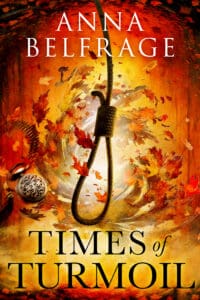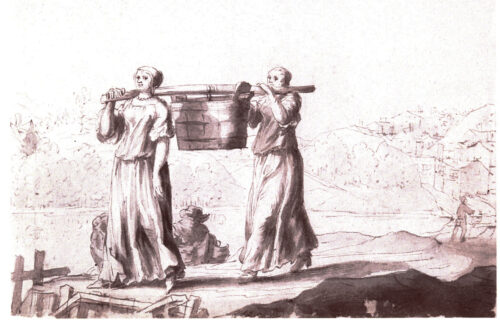
13 Nov Anna Belfrage Times of Turmoil #AmericanColonialHistory #timetravel #historicalfiction #historicalromance @abelfrageauthor @cathiedunn
FEATURED AUTHOR: ANNA BELFRAGE
I am delighted to welcome Anna Belfrage as the featured author in The Coffee Pot Book Club Blog Tour being held between October 24th — November 14th, 2023. She is the author of the Historical Fiction / Time Travel Romance, Times of Turmoil, released by Timelight Press on September 29th, 2023 (382 pages)
Below are highlights of Times of Turmoil, Anna Belfrage’s author bio, and her fascinating post about indentured servants in Colonial America.

Tour Schedule Page: https://thecoffeepotbookclub.blogspot.com/2023/09/blog-tour-times-of-turmoil-by-anna-belfrage.html
HIGHLIGHTS: TIMES OF TURMOIL

Times of Turmoil
by Anna Belfrage
Blurb:
It is 1718 and Duncan Melville and his time traveller wife, Erin, are concentrating on building a peaceful existence for themselves and their twin daughters. Difficult to do, when they are beleaguered by enemies.
Erin Melville is not about to stand to the side and watch as a child is abused—which is how she makes deadly enemies of Hyland Nelson and his family.
Then there’s that ghost from their past, Armand Joseph Chardon, a person they were certain was dead. Apparently not. Monsieur Chardon wants revenge and his sons are tasked with making Duncan—and his wife—pay.
Things aren’t helped by the arrival of Duncan’s cousin, fleeing her abusive husband. Or the reappearance of Nicholas Farrell in their lives, as much of a warped bully now as he was when he almost beat Duncan to death years ago. Plus, their safety is constantly threatened as Erin is a woman of colour in a time and place where that could mean ostracism, enslavement or even death.
Will Duncan and Erin ever achieve their simple wish – to live and love free from fear of those who wish to destroy them?
Buy Links:
This title is available on #KindleUnlimited.
Universal link: https://myBook.to/ToTABG
Amazon US: https://www.amazon.com/dp/B0CJ7FYQVL
Amazon UK: https://www.amazon.co.uk/dp/B0CJ7FYQVL
Amazon CA: https://www.amazon.ca/dp/B0CJ7FYQVL
Amazon AU: https://www.amazon.com.au/dp/B0CJ7FYQVL
AUTHOR BIO: ANNA BELFRAGE

Had Anna been allowed to choose, she’d have become a time-traveller. As this was impossible, she became a financial professional with two absorbing interests: history and writing. Anna has authored the acclaimed time travelling series The Graham Saga, set in 17th century Scotland and Maryland, as well as the equally acclaimed medieval series The King’s Greatest Enemy which is set in 14th century England.
Anna has also published The Wanderer, a fast-paced contemporary romantic suspense trilogy with paranormal and time-slip ingredients.
More recently, Anna has been hard at work with her Castilian series. The first book, His Castilian Hawk, published in 2020, is set against the complications of Edward I’s invasion of Wales. His Castilian Hawk is a story of loyalty, integrity—and love. In the second instalment, The Castilian Pomegranate, we travel with the protagonists to the complex political world of medieval Spain, while the third, Her Castilian Heart, finds our protagonists back in England—not necessarily any safer than the wilds of Spain! The fourth book, Their Castilian Orphan, is scheduled for early 2024.
Anna has recently released Times of Turmoil, the sequel to her 2021 release, The Whirlpools of Time. Here she returns to the world of time travel. Where The Whirlpools of Time had Duncan and the somewhat reluctant time-traveller Erin navigating the complexities of the first Jacobean rebellion in Scotland, in Times of Turmoil our protagonists are in Colonial Pennsylvania, hoping for a peaceful existence. Not about to happen—not in one of Anna’s books!
All of Anna’s books have been awarded the IndieBRAG Medallion, she has several Historical Novel Society Editor’s Choices, and one of her books won the HNS Indie Award in 2015. She is also the proud recipient of various Reader’s Favorite medals as well as having won various Gold, Silver, and Bronze Coffee Pot Book Club awards.
Find out more about Anna, her books and enjoy her eclectic historical blog on her website, www.annabelfrage.com
Author Links:
Website: www.annabelfrage.com
Twitter: https://twitter.com/abelfrageauthor
Facebook: https://www.facebook.com/annabelfrageauthor
Instagram: https://instagram.com/annabelfrageauthor
Book Bub: https://www.bookbub.com/profile/anna-belfrage
Amazon Author Page: http://Author.to/ABG or http://amazon.com/author/anna_belfrage
Goodreads: https://www.goodreads.com/author/show/6449528.Anna_Belfrage
POST: INDENTURED SERVANTS IN COLONIAL AMERICA

In 1681, William Penn sailed across the ocean to found his colony, Pennsylvania. Armed with a royal charter and with a host of enthusiastic Quaker colonists, Penn’s ambition was to create something of a utopian society, as evidenced by the conserved plans for Philadelphia, a town that was to be clean and spacious, ensuring the health of its inhabitants.
William Penn was a Quaker, and most Quakers had firsthand experience of discrimination and persecution, none of which would ever be a problem in the fair colony of Pennsylvania. The Quakers also believed in equality. One of the reasons they were often thrown in jail was because they refused to address anyone with anything but “thou”. When faced with someone higher up the societal scale, one should use “you” – a bit like in French, where “tu” indicates familiarity and equality, “vous” respect. The Quakers insisted on “thou”, no matter if talking to their neighbour or the king. (Not that all that many Quakers ever spoke to the king, but still)
As a religious movement that believed in everyone’s equal value no matter gender, Quakers had—at least in theory—a problem with slavery. However, upon finally reaching their new colony, it soon became apparent that unless they found labour—preferably cheap labour—colonising all this new land would be almost impossible.
There was an established solution to the labour shortage problem, namely the practise of indentureship. This had been around for centuries. In essence, it was a contract whereby one person voluntarily entered the service of another person for a stipulated period of time. In general, any payments for the service were paid out in arrears, which meant an indentured servant who absconded could not claim on his back pay.
By the late 17th century, indentured servants had been around for almost a century in the New World. Initially, many came voluntarily, pledging themselves to work for seven years or so in return for getting a grant of land after their term of service was up. Thing was, the demand for new indentures exceeded the supply, which was how people were sent over without their consent, deported as it were. An efficient way of ridding the homeland of unwanted elements while also ensuring cheap labour for the colonists.
Whether forced or voluntary, the life of an indentured servant was no walk in the park. For a woman, there was the constant risk of being raped – these were societies with a chronic shortage of women – and should she become pregnant her term of service would be extended. The men ended up in the fields, disposable beasts of burden who were often worked until they dropped.
A disobedient (or “wilful”) servant was punished – in some cases so severely as to permanently maim the servant. Trying to run away was a serious offence that could lead to beating so brutal the person in question died, and on top of this the reluctant immigrants had to cope with food shortages and unknown ailments. On average, four out of ten indentured servants died before their terms of service was up. I have written at length about the plight of indentured servants in Like Chaff in the Wind, where my protagonist, Matthew Graham, effectively ends up as a mistreated beast of burden.
Times of Turmoil, however, is set more than fifty years later than Like Chaff in the Wind. Slavery had to a large extent replaced indentureship as the backbone of the economy in colonies like Maryland and Virginia, but in Pennsylvania indentureship still prevailed, albeit that some Quakers were beginning to reassess their take on slavery. Penn himself came to advocate slavery, saying that if you bought a slave you had a servant for life, which was a good thing. Hmm . . .
In Times of Turmoil, I have two indentured servants who play significant parts. One is Hans, the silent and enigmatic German indenture who is treated almost as family by Duncan and Erin Melville. Hans has lost everything he ever had back home and is determined to build a new life far from his past. He is also very anti-violence, having been a reluctant witness to the ravages of war.
Duncan came home to upheaval. Tim was sporting bruises and welts, there was a dead man wrapped in sacking in one of his sheds, and his wife . . . He suppressed the rage that lived inside of him, a snarling thing that growled and snapped whenever he caught sight of Erin’s swollen and bruised face. She looked as if she’d not slept a wink since the incident, and Mrs Andersson hovered round her like a worried mother hen. Only Hans seemed his normal, unruffled self, explaining tersely what had happened.
“Caleb will say you shot his father,” Duncan said with a sigh.
Hans actually smiled. “Ja. But with this, I shoot no one.” He handed over his pistol, and Duncan almost laughed. The flint was missing.
“Giles and Sivert will testify. Keine flint, ja? Never.”
“Then why carry it?” Duncan asked.
“People see what they want to see. A man pointing a pistol is an armed man.” Hans shrugged. “I have enough of killing.”
The other indentured servant is Tim. Some of the most vulnerable indentured servants were the children. Because they were so young—and therefore rather useless to begin with—they could be indentured for up to twenty years so as to recoup on the cost of transportation and bed and board. Tim is twelve when my Erin intercedes to save him from yet another brutal beating. Years of mistreatment have rendered him almost mute, and he flinches at any touch, having been conditioned to expect only pain. Sadly, in real life there were many Tims, lost boys and girls who had no one in their corner. No one. Tim, therefore, is lucky. Because once Erin had saved him, she had no intention of ever letting anyone hurt him again. A happily ever after to that particular indenture story—but then, I am partial to happily ever afters!

 Instagram Handle: @thecoffeepotbookclub
Instagram Handle: @thecoffeepotbookclub


Cathie Dunn
Posted at 04:31h, 14 NovemberThank you so much for hosting Anna Belfrage today, with such a fascinating guest post.
Take care,
Cathie xo
The Coffee Pot Book Club
Linnea Tanner
Posted at 00:21h, 16 NovemberHi Cathie–It was my pleasure to host Anna Belfrage’s novel, “Times of Turmoil.”
Anna Belfrage
Posted at 08:28h, 14 NovemberThank you for inviting me to visit!
Linnea Tanner
Posted at 00:24h, 16 NovemberHi Anna–It was a pleasure to host you and your novel, “Times of Turmoil.” I really enjoyed reading your post about Indentured Servants in Colonial America. Best wishes on the book.
Christy B
Posted at 16:24h, 15 NovemberTo live in peace and freedom… I hope the characters in the book get that, for sure. It sounds like a great read! Another wonderful spotlight, Linnea.
Linnea Tanner
Posted at 00:27h, 16 NovemberHi Christy–Thank you for dropping in and commenting on Anna Belfrage’s novel, “Time of Turmoil.” The post on indentured servants in Colonial America was informative and provided insight on the characters. I’m curious about the time travel in the story.